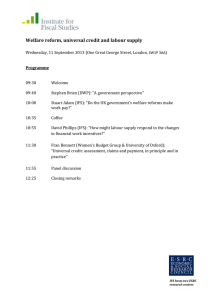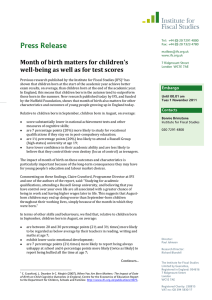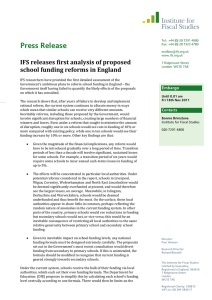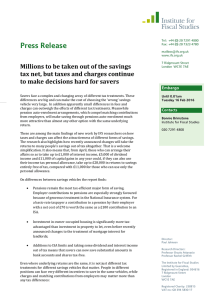Press Release Councils face a difficult task to replace
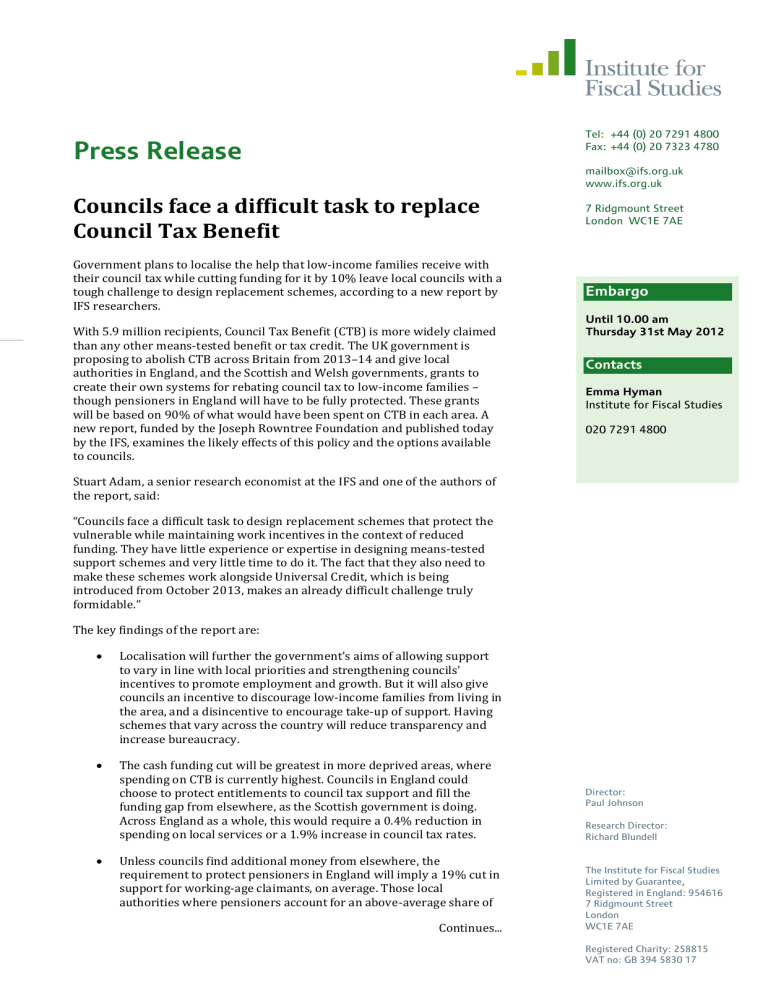
Press Release
Councils face a difficult task to replace
Council Tax Benefit
Government plans to localise the help that low-income families receive with their council tax while cutting funding for it by 10% leave local councils with a tough challenge to design replacement schemes, according to a new report by
IFS researchers.
With 5.9 million recipients, Council Tax Benefit (CTB) is more widely claimed than any other means-tested benefit or tax credit. The UK government is proposing to abolish CTB across Britain from 2013–14 and give local authorities in England, and the Scottish and Welsh governments, grants to create their own systems for rebating council tax to low-income families – though pensioners in England will have to be fully protected. These grants will be based on 90% of what would have been spent on CTB in each area. A new report, funded by the Joseph Rowntree Foundation and published today by the IFS, examines the likely effects of this policy and the options available to councils.
Stuart Adam, a senior research economist at the IFS and one of the authors of the report, said:
“Councils face a difficult task to design replacement schemes that protect the vulnerable while maintaining work incentives in the context of reduced funding. They have little experience or expertise in designing means-tested support schemes and very little time to do it. The fact that they also need to make these schemes work alongside Universal Credit, which is being introduced from October 2013, makes an already difficult challenge truly formidable.”
The key findings of the report are:
Localisation will further the government’s aims of allowing support to vary in line with local priorities and strengthening councils’ incentives to promote employment and growth. But it will also give councils an incentive to discourage low-income families from living in the area, and a disincentive to encourage take-up of support. Having schemes that vary across the country will reduce transparency and increase bureaucracy.
The cash funding cut will be greatest in more deprived areas, where spending on CTB is currently highest. Councils in England could choose to protect entitlements to council tax support and fill the funding gap from elsewhere, as the Scottish government is doing.
Across England as a whole, this would require a 0.4% reduction in spending on local services or a 1.9% increase in council tax rates.
Unless councils find additional money from elsewhere, the requirement to protect pensioners in England will imply a 19% cut in support for working-age claimants, on average. Those local authorities where pensioners account for an above-average share of
Continues...
Tel: +44 (0) 20 7291 4800
Fax: +44 (0) 20 7323 4780 mailbox@ifs.org.uk www.ifs.org.uk
7 Ridgmount Street
London WC1E 7AE
Embargo
Until 10.00 am
Thursday 31st May 2012
Contacts
Emma Hyman
Institute for Fiscal Studies
020 7291 4800
Director:
Paul Johnson
Research Director:
Richard Blundell
The Institute for Fiscal Studies
Limited by Guarantee,
Registered in England: 954616
7 Ridgmount Street
London
WC1E 7AE
Registered Charity: 258815
VAT no: GB 394 5830 17
…continued
CTB expenditure would need to make larger percentage cuts to support for working-age claimants: for one in ten English local authorities, it would be more than 25%, with the highest value being
33% in East Dorset and in Craven, North Yorkshire.
Any cuts to council tax support are bound to hit lower-income households, as 85% of CTB goes to the lower-income half of households and almost half of CTB goes just to the lowest-income fifth.
Means-testing support for council tax more aggressively could protect the very poorest altogether, with the losses concentrated on low-to-middle income households. But to save the full 10% by which funding is being cut purely from means-testing more aggressively would require the means test to be so severe that some people would be worse off after a pay rise.
So reforms that would save the full 10% typically involve reducing support for those currently entitled to maximum CTB – those with the lowest incomes. These policies mean that all households, even those on the lowest incomes, would have to pay some council tax. The poll tax experience showed how difficult it can be to collect small amounts of tax from low-income households that are not used to paying it.
One flexibility not being offered to local authorities is over the single person discount in the council tax system. Reducing this discount would raise revenue predominantly from better-off households and reduce the current distortionary incentive for people living alone to occupy larger properties. Central government should consider either making this change itself (if it finds the distributional consequences acceptable) or, in the spirit of localisation, giving LAs the power to do so if they see fit.
Councils will have to consider carefully how their new council tax rebate schemes will work alongside Universal Credit, which will be phased in from October 2013 and will ultimately replace all other means-tested benefits and tax credits for those of working age.
Universal Credit is intended to simplify the benefit system by reducing the number of different benefits that claimants and administrators must contend with. Keeping council tax support separate – and indeed allowing it to vary across the country – severely undermines this simplification. Universal Credit is also intended to rationalise work incentives by replacing a jumble of overlapping means tests with a single one, ensuring that overall effective tax rates cannot rise too high. Again, separate means tests for council tax support could undermine this, with the potential to reintroduce some of the extremely weak work incentives that
Universal Credit was supposed to eliminate. It is difficult to think of reasons why fully integrating CTB into Universal Credit would be inferior to what is now being proposed.
One specific issue raised by the introduction of Universal Credit is that particular benefits currently used to ‘passport’ people automatically to maximum CTB entitlement will cease to exist as they
Continues...
The Institute for Fiscal Studies
Limited by Guarantee,
Registered in England: 954616
7 Ridgmount Street
London
WC1E 7AE
…continued are subsumed within Universal Credit. At present two-thirds of CTB recipients are passported in this way, and if all these people needed to go through a full means test, the burden on both claimants and local authorities would increase substantially. One way to mitigate this would be to transfer Universal Credit data to local authorities, to avoid having to ask claimants for the information again – if IT systems can be set up to transfer data in a timely and efficient way.
James Browne, a senior research economist at the IFS and the other author of the report, commented:
“Cutting support for council tax and localising it are two distinct policy choices: either could have been done without the other. Whether you think that cutting council tax support for low-income families is the best way to reduce government borrowing by £500 million will depend on your views about how much redistribution the state ought to do. But the advantages of localisation seem to be outweighed by the disadvantages, particularly as it has the potential to undermine many of the positive impacts of Universal Credit.”
ENDS
Notes to Editors:
1. For embargoed copies of the report or other queries, contact Emma Hyman at
IFS on 020 7291 4800 or emma_h@ifs.org.uk.
2. ‘Reforming Council Tax Benefit’ by Stuart Adam and James Browne will be launched at a briefing at 10am on Thursday 31 May 2012
( http://www.ifs.org.uk/events/780 ). Please let Emma Hyman know if you would like to attend: 020 7291 4800 or emma_h@ifs.org.uk.
3. Since this report went to press, the government has issued more technical guidance on the policy for local authorities and further details about how grants will be distributed between local authorities. These do not significantly affect the findings of the report.
4. A companion report focusing on options for Wales will be published in June.
5. The authors gratefully acknowledge funding from the Joseph Rowntree
Foundation and from the ESRC Centre for the Microeconomic Analysis of Public
Policy at the Institute for Fiscal Studies (RES-544-28-5001). JRF is an endowed foundation funding a UK-wide research and development programme. It is one of the largest social policy research organisations in the UK. For further information go to www.jrf.org.uk
, or contact Danny Wright, JRF Media
Relations, on 01904 615958 or daniel.wright@jrf.org.uk.
The Institute for Fiscal Studies
Limited by Guarantee,
Registered in England: 954616
7 Ridgmount Street
London
WC1E 7AE


